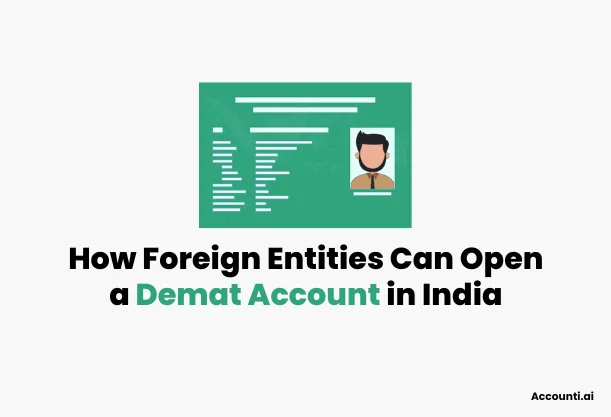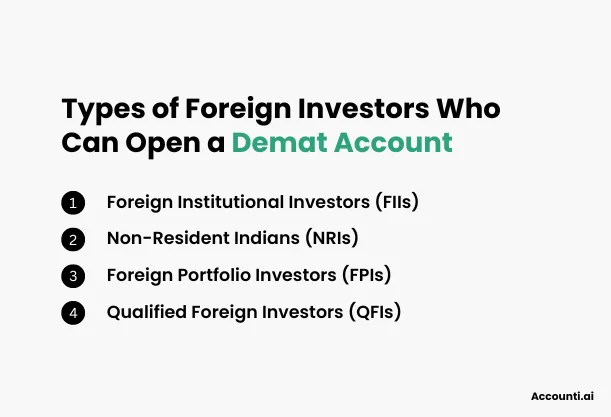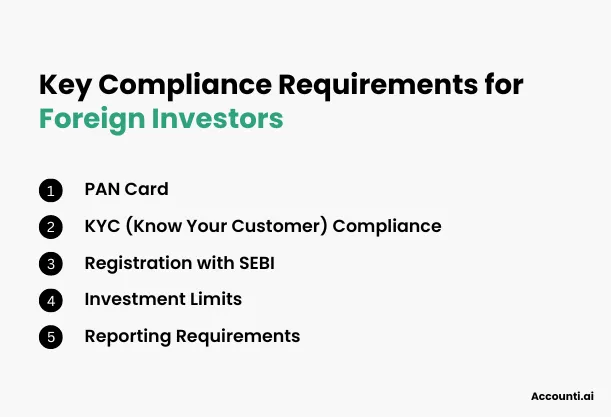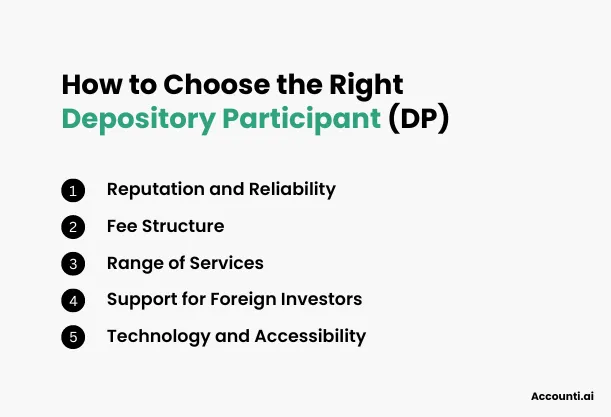
Step-by-Step Guide for Foreign Entities to Open a Demat Account in India
If you're a foreign entity looking to invest in the Indian stock market, you're likely exploring your options to make the process as smooth as possible. Opening a Demat account is your first step in that direction. But what exactly is a Demat account, and why is it so important?
Simply put, a Demat account allows you to hold shares and securities in an electronic format, making it easier to manage and trade without the hassle of physical certificates. It’s a bit like having a digital wallet for your investments. For foreign investors, it’s the gateway to participating in India’s bustling financial market.
Why does this matter? Well, India is an exciting place to be for investors right now. There’s a lot happening across various sectors, and the stock market reflects this dynamism. Whether you’re an institutional investor or an individual looking to diversify your portfolio, having a Demat account is essential. Without one, you can’t trade or invest in Indian securities.
In this guide, we’ll break down everything you need to know to get started. From understanding the regulatory landscape to choosing the right type of Demat account, we’ve got you covered. Let’s walk through the process step-by-step to ensure you’re fully prepared to enter the Indian market with confidence.
Understanding the Regulatory Environment
When it comes to investing in India as a foreign entity, it’s essential to get a grip on the regulatory framework governing your investments. This section will guide you through the key regulations, the types of foreign investors eligible to open a Demat account, and the compliance requirements you need to keep in mind.
SEBI Guidelines for Foreign Investors
The Securities and Exchange Board of India (SEBI) is the primary regulatory body overseeing the Indian securities market. It has set specific rules to ensure transparency, investor protection, and market integrity. For foreign entities, understanding these guidelines is crucial to navigate the complexities of the Indian stock market.
SEBI categorizes foreign investors mainly into two groups:
- Foreign Institutional Investors (FIIs): These are large entities such as pension funds, mutual funds, and insurance companies that want to invest in Indian markets. They usually need to register with SEBI and follow certain regulatory norms.
- Foreign Portfolio Investors (FPIs): This category includes smaller foreign investors, such as individuals, family offices, and funds that invest in a diversified portfolio of Indian securities. The registration process for FPIs is more streamlined compared to FIIs, making it easier for smaller entities to participate.
SEBI’s guidelines ensure that foreign investments contribute positively to the Indian market while safeguarding the interests of local investors. Compliance is non-negotiable, and failure to adhere to these regulations can result in hefty penalties or even a ban from trading.
Types of Foreign Investors Eligible to Open a Demat Account
Foreign entities looking to open a Demat account in India generally fall into one of the following categories:

- Foreign Institutional Investors (FIIs): Large entities looking to make substantial investments in Indian markets.
- Non-Resident Indians (NRIs): Indian citizens living abroad who want to invest in India. They can open either repatriable or non-repatriable Demat accounts.
- Foreign Portfolio Investors (FPIs): Entities that invest in a range of Indian securities but do not have the scale or structure of FIIs.
- Qualified Foreign Investors (QFIs): Individual foreign investors who do not fall under the above categories but want to participate in the Indian market.
Each of these categories has different requirements and benefits, and it’s essential to choose the one that best fits your investment strategy.
Key Compliance Requirements for Foreign Investors
Navigating the compliance landscape can feel a bit like deciphering a complex puzzle, but it's a necessary step. Here are some key requirements to keep in mind:

- PAN Card: Foreign investors must have a Permanent Account Number (PAN) card to open a Demat account. This is a unique identification number issued by the Indian Income Tax Department.
- KYC (Know Your Customer) Compliance: All foreign investors need to go through the KYC process, which involves verifying identity, address, and other personal details. This is mandatory for opening and operating a Demat account.
- Registration with SEBI: Depending on your investor category (FII, FPI, or NRI), you may need to register with SEBI. This process can be complex, requiring various forms and documentation.
- Investment Limits: There are caps on how much foreign entities can invest in specific sectors. It’s important to be aware of these limits to avoid any regulatory issues.
- Reporting Requirements: Foreign investors must periodically report their investment activities to SEBI and the Reserve Bank of India (RBI). This ensures transparency and helps regulators monitor the flow of foreign capital.
Understanding these regulatory aspects not only helps you stay compliant but also ensures a smoother and more secure investment journey. It’s like having a solid foundation before you start building your investment portfolio.
Types of Demat Accounts for Foreign Entities
Before diving into the process of opening a Demat account, it’s essential to understand the types available to foreign entities. Choosing the right type of account can significantly impact your investment experience and the repatriation of funds. In India, there are two primary types of Demat accounts for foreign investors: Repatriable and Non-Repatriable. Let's explore both in detail.
Repatriable Demat Account
A Repatriable Demat account is designed for foreign investors who want the flexibility to transfer their earnings from investments in India back to their home country. This type of account is particularly useful for those who wish to liquidate their investments and move the funds abroad without any restrictions.
Key Features and Benefits:
- Fund Repatriation: The primary advantage of a repatriable account is that it allows for the easy transfer of funds back to the investor’s home country. This is ideal for investors who need liquidity and the ability to access their funds internationally.
- Eligibility: This type of account is generally available to Non-Resident Indians (NRIs) and Foreign Portfolio Investors (FPIs). It requires the investor to have an NRE (Non-Resident External) bank account, which facilitates the repatriation of both principal and interest earnings.
- Tax Benefits: Funds held in a Repatriable account are not subject to double taxation, provided the investor’s country has a Double Tax Avoidance Agreement (DTAA) with India.
Limitations:
- Investment Restrictions: There are certain sectors where foreign investments are capped, and Repatriable account holders must adhere to these limits. For example, investments in certain government bonds or specific industries may be restricted.
- Documentation Requirements: The documentation process is more stringent compared to a Non-Repatriable account. Investors need to provide additional proofs such as a valid visa, passport, and NRE bank account details.
Non-Repatriable Demat Account
A Non-Repatriable Demat account, as the name suggests, does not allow for the repatriation of funds. This means that while you can invest and trade in Indian securities, the proceeds from these investments must remain in India. It’s a suitable option for foreign investors who are looking to keep their earnings within the country, perhaps for reinvestment or personal use.
Key Features and Benefits:
- Ease of Setup: Setting up a Non-Repatriable Demat account is generally more straightforward compared to a Repatriable account. The documentation requirements are less stringent, and the account can be linked to an NRO (Non-Resident Ordinary) bank account.
- Flexibility in Investments: Investors can freely invest in a wide range of securities, including stocks, bonds, and mutual funds, without worrying about the complexities of fund repatriation.
- Lower Compliance Requirements: Since there is no outflow of funds to a foreign country, the compliance and reporting requirements are relatively relaxed.
Limitations:
- No Fund Repatriation: The most significant drawback is that the funds cannot be transferred outside of India. This can be a limitation for investors who need liquidity in their home country.
- Taxation: Earnings in a Non-Repatriable account are subject to local taxes in India. While DTAAs can reduce the tax burden, they do not eliminate it entirely.
- Investment Limits: Like Repatriable accounts, there are caps on foreign investment in certain sectors, which must be adhered to by Non-Repatriable account holders.
Choosing the Right Demat Account for Your Needs
The choice between a Repatriable and Non-Repatriable Demat account depends on your investment goals and financial needs. If you’re looking to invest in India and need the flexibility to transfer funds abroad, a Repatriable account is the way to go. On the other hand, if you’re planning to keep your earnings in India, perhaps for reinvestment or to support family members, a Non-Repatriable account is a better fit.
Here’s a quick comparison to help you decide:
|
Feature |
Repatriable Demat Account |
Non-Repatriable Demat Account |
|
Fund Repatriation |
Allowed |
Not Allowed |
|
Linked Bank Account |
NRE Account |
NRO Account |
|
Documentation Requirements |
More stringent |
Less stringent |
|
Taxation |
Subject to DTAA benefits |
Local Indian taxation applies |
|
Investment Sectors |
Limited in certain sectors |
Limited in certain sectors |
|
Ease of Setup |
Moderate |
Easier |
Step-by-Step Process to Open a Demat Account
Now that you have a clear understanding of the types of Demat accounts available for foreign entities, it's time to get into the details of how to open one. This section will guide you through each step, ensuring you know exactly what to do at every stage. Opening a Demat account might seem complicated, but breaking it down step-by-step makes it much more manageable.
Step 1: Choose the Right Depository Participant (DP)
A Depository Participant (DP) is like a bridge between you, the investor, and the depository where your securities are held. In India, there are two main depositories: the National Securities Depository Limited (NSDL) and the Central Depository Services Limited (CDSL). Choosing the right DP is crucial because they handle your account operations, transaction services, and customer support.
If you’re unsure about selecting a DP or need end-to-end assistance, Accounti’s Demat account setup services can help you make an informed decision and manage the entire process smoothly.
How to Choose the Right DP:

- Reputation and Reliability: Look for a DP with a solid reputation and positive customer reviews. Larger financial institutions and well-established brokers often provide more reliable services.
- Fee Structure: Different DPs have varying fee structures, including account opening fees, annual maintenance charges, and transaction fees. Compare these costs and choose a DP that offers a good balance between cost and services.
- Range of Services: Ensure that the DP offers services that align with your investment needs. Some DPs offer value-added services like research reports, market insights, and portfolio management, which can be beneficial.
- Support for Foreign Investors: Not all DPs cater to foreign investors. Make sure the DP you choose has experience handling accounts for foreign entities and understands the specific regulatory and compliance needs.
- Technology and Accessibility: Check if the DP offers user-friendly platforms for trading and account management. Mobile apps and online portals can make managing your investments more convenient.
Step 2: Documentation Required
Once you’ve chosen your DP, the next step is to gather the necessary documents. The documentation process for foreign entities can be complex. If you need professional guidance, Accounti offers expert support in gathering and preparing all necessary documents, ensuring a hassle-free setup.
Documents Required for Foreign Entities:
- Proof of Identity: A valid passport is the most commonly accepted proof of identity. Ensure that your passport is up-to-date and has sufficient validity.
- Proof of Address: You’ll need to provide a proof of address, which could be a utility bill, bank statement, or rental agreement. The address must match the one on your application form.
- PAN Card: A Permanent Account Number (PAN) card issued by the Indian Income Tax Department is mandatory for all investors. If you don’t have a PAN card, you’ll need to apply for one.
- Bank Account Details: For Repatriable accounts, you’ll need to provide your NRE bank account details. For Non-Repatriable accounts, NRO bank account details are required.
- KYC Compliance: This involves submitting your personal details, along with copies of your passport-sized photograph and signature. You may also need to fill out a Know Your Customer (KYC) form provided by the DP.
- Foreign Investment Registration Certificate (if applicable): Depending on the type of foreign entity, you may need to provide additional registration documents as required by SEBI.
- Power of Attorney (PoA): In some cases, a PoA may be required if the documentation is being handled by someone else on your behalf. Ensure that this is notarized and apostilled if necessary.
Step 3: Fill and Submit the Account Opening Form
Once you have all your documents in order, the next step is to fill out the Demat account opening form provided by your chosen DP. This form will require you to provide detailed information about yourself and your investment preferences.
Key Sections of the Account Opening Form:
- Personal Information: This includes your name, date of birth, and contact details. Ensure that all information matches your documentation to avoid discrepancies.
- Account Type: Specify whether you are opening a Repatriable or Non-Repatriable Demat account. Make sure this aligns with your investment strategy.
- Bank Details: Provide the bank account details that will be linked to your Demat account. Double-check the accuracy to avoid any issues during transactions.
- Nominee Details: You can nominate a person to inherit your securities in case of an unforeseen event. This is optional but recommended.
- Declaration and Signature: Read the terms and conditions carefully before signing. This is a crucial step as it legally binds you to the DP’s policies.
Tips to Avoid Common Mistakes:
- Double-Check Information: Ensure that all information provided is accurate and matches the documentation submitted.
- Sign in the Right Places: The form may have multiple places for signatures, such as the main form, KYC form, and any additional declarations. Missing signatures can delay your application.
- Provide All Required Documents: Missing even a single document can lead to delays. Use a checklist to ensure you’ve included everything.
Step 4: Verification Process
After submitting your application form and documents, the DP will initiate a verification process. This is a crucial step where the DP ensures that all the information provided is accurate and complies with regulatory requirements.
What to Expect During Verification:
- Document Verification: The DP will check all submitted documents for authenticity and completeness. They may contact you if additional information or clarification is needed.
- In-Person Verification (IPV): Some DPs may require an in-person verification, especially for foreign entities. This could involve a video call or visiting the DP’s office. Be prepared with your original documents for this step.
- Processing Time: The verification process can take anywhere from a few days to a couple of weeks, depending on the DP and the complexity of your application. You can check the status of your application online or by contacting your DP.
Step 5: Fund the Account
Once your Demat account is verified and activated, the next step is to fund it. For foreign entities, this involves transferring money from your overseas bank account to your linked Indian bank account.
How to Fund Your Demat Account:
- Repatriable Account: Transfer funds from your overseas account to your NRE bank account in India. These funds can then be used for investments, and any profits can be repatriated.
- Non-Repatriable Account: Transfer funds to your NRO bank account. Remember, these funds cannot be repatriated, and the proceeds must stay in India.
- Currency Conversion: Keep in mind the current exchange rate when transferring funds. The bank may charge a conversion fee, so it’s wise to check this in advance.
- Understanding Repatriation Rules: For repatriable accounts, be aware of the limits and rules regarding how much you can transfer back to your home country. This can vary based on your investor category and the type of investment.
Step 6: Activating and Using the Demat Account
With your account funded, you’re now ready to start investing! Activating and using your Demat account involves a few final steps to ensure you’re fully set up.
How to Activate and Use Your Account:
- Account Activation: Once your funds are available, your DP will activate your account. You’ll receive an account number (also known as a Beneficiary Owner ID or BO ID) and login credentials for your online account.
- Trading Platform: Familiarize yourself with the DP’s trading platform. Most DPs offer web-based platforms and mobile apps for trading. Explore the features, such as market insights, research reports, and portfolio tracking.
- Placing Orders: You can now buy and sell securities. When placing an order, ensure you have sufficient funds in your linked bank account. Keep an eye on the brokerage and transaction fees associated with each trade.
- Monitoring Your Investments: Use the tools provided by your DP to monitor your portfolio. Stay updated on market trends and adjust your investments as needed.
- Compliance and Reporting: Regularly check for any updates in regulations that may affect your investments. Ensure you are compliant with SEBI guidelines and file any required reports.
Key Considerations for Foreign Entities
Opening a Demat account as a foreign entity involves more than just understanding the regulatory requirements and documentation. It’s crucial to be aware of various considerations that can impact your investment strategy, such as taxation, currency exchange, and repatriation rules. This section delves into these factors to help you make informed decisions and avoid potential pitfalls.
Tax Implications
Taxation is a major consideration for any investor, and foreign entities are no exception. The Indian tax system has specific rules for foreign investors, which vary depending on the type of income generated, such as dividends, capital gains, and interest. Here’s what you need to know:
1. Tax on Dividends:
Foreign investors are subject to a withholding tax on dividends earned from Indian companies. The rate of tax can vary based on the investor’s country of residence and whether a Double Tax Avoidance Agreement (DTAA) is in place. If there is a DTAA, you may be eligible for a lower tax rate or exemption.
2. Tax on Capital Gains:
- Short-Term Capital Gains (STCG): If you sell equity shares or mutual funds within 12 months, the gains are classified as short-term and taxed at 20%. This is relatively straightforward for foreign investors.
- Long-Term Capital Gains (LTCG): Gains from selling securities after 12 months are considered long-term and are taxed at 12% if they exceed ₹1 lakh in a financial year. Note that indexation benefits, which adjust the purchase price to account for inflation, are not available for foreign investors.
3. Tax on Interest Income:
If you invest in debt securities like bonds or debentures, the interest income is subject to a withholding tax, typically around 20%. However, this can be reduced under a DTAA, depending on the terms agreed between India and your country of residence.
4. DTAA Benefits:
India has DTAAs with several countries to avoid double taxation of income. If your country has a DTAA with India, you may be able to offset the tax paid in India against your tax liability in your home country. It’s advisable to consult a tax expert to understand the implications of the DTAA on your investments.
Currency Exchange and Repatriation Rules
For foreign investors, currency exchange rates and repatriation rules are vital considerations. Exchange rate fluctuations can significantly impact your returns, especially in a volatile market like India.
1. Exchange Rate Considerations:
When you invest in Indian securities, you’re exposed to the risk of currency fluctuations. The value of the Indian Rupee (INR) against your home currency can vary, impacting the overall value of your investment. It’s wise to keep an eye on exchange rate trends and consider hedging options if necessary.
2. Repatriation Rules:
Repatriation refers to transferring your investment proceeds back to your home country. For repatriable accounts, you can repatriate both the principal amount and the earnings, subject to certain limits. However, for non-repatriable accounts, the funds must remain in India, and you can only use them for local investments or expenses.
3. Limits and Restrictions:
The Reserve Bank of India (RBI) has set specific limits on the amount that can be repatriated in a financial year. Exceeding these limits may require special permission from the RBI. It’s important to be aware of these rules to avoid complications when transferring funds.
Conclusion
Investing in India as a foreign entity offers numerous opportunities but also comes with its own set of challenges. Understanding the regulatory environment, choosing the right type of Demat account, and staying compliant with SEBI and RBI guidelines are crucial steps to ensure a successful investment experience. By being aware of the key considerations outlined in this guide, you can make informed decisions and optimize your investment strategy.
Opening a Demat account in India can be a complex process, but it’s crucial for foreign entities looking to invest. If you’re looking for expert assistance, Accounti offers a full-service solution to simplify your Demat account setup and management.

 Rohit Kapoor
Rohit Kapoor

